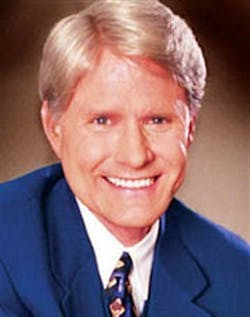Good leaders watch like a hawk for decisions that fail to uphold the company's mission, advance its vision, and express its core values.
It sounds like some utopian B-school dogma, but compelling evidence points to a direct link between ethical leadership and higher profits. That's according to the Center for Ethical Business Cultures (full disclosure: I'm a board member) in its recent study, "The Ethical Advantage: Why Ethical Leadership is Good Business." Certainly, ethical leadership offers no protection against a badly flawed business model or strategy. But a fundamentally ethical organization stands to gain an advantage by developing four traits.
1) Balanced stakeholder interests. Look around. You aren't operating in a vacuum. Your company fits into a larger community. Its relationships -- with employees, customers, business partners -- are intertwined. Tending the till in an enlightened social context drives superior financial performance. A firm generates this virtuous circle when it honors employees, who turn around and produce a high quality product. Ultimately, customers are so pleased that they become pied pipers leading everyone else in town to your door.
Whenever our executive team voted on a big issue, we first mulled over its effect on all our constituencies. Our three-word litmus test -- "Is it fair?" -- exposed flawed analysis and produced better decisions.
For instance, when we voted on our company insurance programs, we tried to balance what was best for the company with what was best for the employees.
[PAGEBREAK]
2) Leadership integrity. Tires Plus stores were upscale, with cappuccino machines, prints on the walls, TV and movies, toys for kids, and shiny, clean floors for them to play on. As you know, the retail tire industry is often tagged as unprofessional, so I wanted to set Tires Plus apart by presenting a clean-cut, professional image.
Some team members thought we went too far. An internal survey showed that 60% of our sales staff hated wearing white shirts and ties. The issue came to a vote at an executive-team meeting. I voted yes. Everyone else voted no. I vetoed the team's decision, one of only a handful of times I overruled everyone.
Conflict like this will certainly produce backlash. But enlightened entrepreneurs tune out the grumbling. They're purpose pleasers, not people pleasers. They're less concerned about who is right than what is right. Base your decisions on what's best for all stakeholders, in the broadest sense of the word. Long-term benefits are worth the short-term price. Set the ethical tone by modeling West Point's "Cadet Prayer:"
Make us to choose the harder right instead of the easier wrong, and never to be content with a half truth when the whole can be won.
3) Process integrity. Otherwise known as institutional integrity, process integrity is a reflection of how deeply a company's ethics are ingrained in its core processes. Every element must be held to the same high standard. People, as well as procedures, are accountable for results. In an environment like this, employees feel free, and perhaps obligated, to report individual and organizational breaches of conduct. They follow their scruples, even at the cost of profits.
It's a principle that guides Reell Precision Manufacturing Corp., a 37-year-old manufacturer of electromechanical components like clutches and hinges. When fears of a recession plunged orders and revenue in 2001, Reell executives asked employees to take a temporary pay cut to avoid layoffs. Employees readily accepted the proposal because the dozen senior execs had already stepped up and slashed 16% off their own pay. Reell saved half a million dollars -- and dozens of jobs.
That's business as usual for the Vadnais Heights, Minn., company, awarded the 2002 Minnesota Business Ethics Award. The good will between Reell's management and labor propels the company's virtuous circle. "Turnover is almost zero," said Reell cofounder Bob Wahlstedt. "The most important reason for enriching the production jobs is to benefit the workers -- they're happier and more fulfilled.
But from the company's standpoint, encouraging and educating employees to develop mastery in their work, and to take pride in it, makes for a consistently better product." Reell's faith in its people and processes produces stratospheric quality achievements. Of the roughly half a million units Reell shipped annually to Xerox, not one was rejected during a four-year span.
[PAGEBREAK]
Ironically, times of crisis magnify a firm's ethical advantage. When everyone -- employees, customers, business partners -- categorically trusts a firm, they're more likely to pitch in to help it weather a storm. Six months after Reell's pay cut, the company restored salaries and returned to profitability.
4) Environmental stewardship. It's a good bet that Buddha wasn't contemplating the relationship between commerce and the environment when he said, "Do no harm." Who knows? The fact is, protecting our natural resources is a business' moral responsibility.
Every Tires Plus store recycled paper and plastic. In our hydraulic lifts for vehicles, we used biodegradable vegetable oil instead of petroleum-based oil whenever possible. Spent tires were chopped into hockey puck-size chips and burned for fuel in EPA-approved facilities. We even teamed up with the U.S. Department of Transportation to produce guidelines that showed drivers how to tread easier on the environment.
Why all the fuss? Because a healthy earth is good business. My friend Terry Tamminen, a fellow board member for the International Waterkeeper Alliance, which he co-founded, was so persuasive with this argument that California Governor Arnold Schwarzenegger tapped him for a Cabinet secretary post.
"The numbers on the bottom of the balance sheet will grow in direct proportion to the balance of clean air, clean water, and healthy landscapes we bequeath to our kids," said Terry, who previously served as the Secretary of the California Environmental Protection Agency.
"For example, installing energy-efficient lighting and electrical equipment pays for itself in as little as 18 months and reduces the need to burn fossil fuels.
”How many business decisions do you make that are good for both the soul and the cash register?"
[PAGEBREAK]
From The Big Book of Small Business by Tom Gegax with Phil Bolsta. Copyright (c) 2005, 2006 by Tom Gegax. Published by arrangement with HarperCollins Publishers.
Best-selling author Tom Gegax, cofounder and chairman emeritus of Tires Plus stores, served as that company's chairman and CEO for 24 years. By the time he sold the company in July 2000, it had mushroomed from a concept sketched on a restaurant napkin to a market leader with 150 upscale stores in 10 states and $200 million in revenue.
Thanks to Tom's warm-hearted, tough-minded approach to management, and his team's relentless focus on customer service, the company's turnover rate ranked among the industry's lowest, and its guest enthusiasm index reached 98%. He was named Modern Tire Dealer's Tire Dealer of the Year in 1998 and a Midwest Entrepreneur of the Year by Inc. magazine.
In 2000, Gegax founded Gegax Management Systems (www.gegax.com) to help growing companies raise profits and reduce stress through fast and affordable business management guidance.




